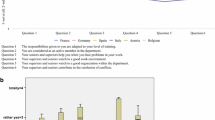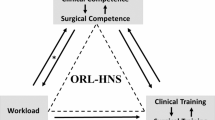Abstract
Europe-wide efforts are being initiated to define quality standards and harmonize Otolaryngology, Head and Neck Surgery (ORL-HNS)-specialty-training by creating an European board examination. However, differences within and between countries remain and are underinvestigated making comparisons and further improvement more difficult. The study aimed at assessing quality of training, satisfaction and quality of life of residents and recent ORL-HNS specialists in Spain and to trace similarities and differences to France and Germany administering anonymous online-questionnaire to ORL-HNS-residents and recent specialists. 146 questionnaires were returned with answers of 75.6 % of residents, a mean age of 30 years and a female to male ratio of 1.46:1. The global satisfaction of training was high as 76 % would choose the same ENT training again, 86 % confirmed that responsibilities which were given to them were adapted to their level of training and 97 % felt well considered in their department. Ninety-two confirmed that helpful seniors contributed to a good work environment (75 %) and to a good organization within the department (69 %). The respondents spent on average 8.8 h per day at the hospital and covered on average 4.8 night duties or week-end shifts per month with mostly no post-day off (86 %). Seventy-four percent participated regularly at complementary training sessions. Research work was supported and guided in 59 %. This study is the first one, to our best of knowledge, to assess the ORL-HNS-training in Spain and to trace parallelisms and differences to other European countries, such as France and Germany. The satisfaction of training and supervision was high in Spain, but there are still efforts to make concerning resident’s quality of life. Compared to France and Germany, satisfaction with ORL-HNS-training and the support and guidance provided by seniors was similar. Work conditions were comparable to those in France. Motivation, teaching and scientific output was higher in Spain, despite the salary being the lowest.



Similar content being viewed by others
References
AAMC (2008) Recommendations for clinical skills curricula for undergraduate medical education. task force on the clinical skills education of medical students. Association of American Medical Colleges. https://www.aamc.org/download/130608/data/clinicalskills_oct09.qxd.pdf.pdf. Accessed 25 June 2015
Barger LK, Ayas NT, Cade BE et al (2006) Impact of extended-duration shifts on medical errors, adverse events, and attentional failures. PLoS Med 3:e487
Bello DB (2012) The resident as a teacher, Quo vadis? [Article in Spanish]. Rev Clin Esp 212(5):255–258
Bernal BD, de Tena TJ, Barrios BJ, Lasheras BM, de la Fuente GDA, Zapata MR (2014) The resident as teacher: medical students’ perception in a Spanish university. Rev Clin Esp 214(7):371–376
Biedma-Velazquez L, Serrano-Del-Rosal R, Garcia-De-Diego JM et al (2012) Dissatisfaction with residency: a discrepancy between preferences and expectations? Med Teach 34:e772–e778
Borraci RGG, Rubio M, Eb Arribalzaga (2008) Estilos de aprendizaje en estudiantes universitarios y medicos residentes [learning styles in university students and medical residents]. Educ Med 11(4):229–238
Capozzi JD, Rhodes R (2000) Residency training. J Bone Joint Surg Am 82:1356–1357
Coates KW, Kuehl TJ, Bachofen CG et al (2001) Analysis of surgical complications and patient outcomes in a residency training program. Am J Obstet Gynecol 184:1380–1383 (discussion 1383–1385)
Council GM (2012) Leadership and management for all doctors. http://www.gmc-uk.org/static/documents/content/LandM_guidance.pdf. Accessed 25 June 2015
Czeisler CA (2006) The Gordon Wilson Lecture: work hours, sleep and patient safety in residency training. Trans Am Clin Climatol Assoc 117:159–188
Di Stasi LL, Mccamy MB, Macknik SL et al (2014) Saccadic eye movement metrics reflect surgical residents’ fatigue. Ann Surg 259:824–829
Golub JS, Weiss PS, Ramesh AK et al (2007) Burnout in residents of otolaryngology-head and neck surgery: a national inquiry into the health of residency training. Acad Med 82:596–601
http://www.Ebeorl-Hns.Org. Accessed 25 June 2015
Lobato RD, Lagares A, Villena V et al (2015) The method of selection of the residents in Spain. Analysis of the examination MIR and offer of a new methodology. Neurocirugia (Astur) 26:53–63
Lobato RD, Lagares A, Villena V et al (2015) Selection of medical graduates for residency posts. A comparative study of the methodologies used in different countries. Neurocirugia (Astur) 26:3–12
Lopez-Valcarcel BG, Ortun V, Barber P et al (2013) Ranking Spain’s medical schools by their performance in the national residency examination. Rev Clin Esp (Barc) 213:428–434
Namdari S, Baldwin KD, Weinraub B et al (2010) Changes in the number of resident publications after inception of the 80 h work week. Clin Orthop Relat Res 468:2278–2283
Oker N, Escabasse V, Al-Otaibi N et al (2015) Acquisition of diagnostic and surgical skills in otorhinolaryngology: a comparison of France and Germany. Eur Arch Otorhinolaryngol 272(11):3565–3573
Oker N, Escabasse V, Pensky H et al (2014) Training satisfaction and work environment in Otorhinolaryngology, Head and Neck surgery: a comparison between France and Germany. Eur Arch Otorhinolaryngol 271:2565–2573
Prins JT, Gazendam-Donofrio SM, Tubben BJ et al (2007) Burnout in medical residents: a review. Med Educ 41:788–800
Puerta JL, Martin-Moreno JM, Bravo S et al (2011) Evaluation of the research performed in Spanish hospitals. Rev Clin Esp 211:169–178
Royal College of Surgeons of England (2014) Professional Standards. Good Surgical Practice. The Royal College of Surgeons of England https://www.rcseng.ac.uk/surgeons/surgical-standards/professionalism-surgery/gsp/documents/good-surgical-practice-pdf. Accessed 25 June 2015
Zambudio AR, Gascón FS, Moro LG, Fernández MG (2004) Research training during medical residency (MIR). Satisfaction questionnaire. [Article in English, Spanish]. Rev Esp Enferm Dig 96(10):695–699
Aracil XS, Soto SN, Rodríguez OA, Bosch JH, Vioque SM, Navarro DC, Cantarin CC, Diaz CG (2009) 4 years experience with the AEC residents E-Book [Article in Spanish]. Cir Esp 86(3):147–153
Serra-Aracil X, Navarro Soto S, Hermoso Bosch J et al (2012) A prospective, multicentre study on the activity of general and digestive surgery residents based on the use of the computerised logbook. Cir Esp 90:518–524
Serrano RCJ, Biedma L, Lopez I, Ramırez A (2009) La formacion en el Sistema Sanitario Publico de Andalucıa I. Un analisis sociologico cualitativo. Consejerıa de Salud de la Junta de Andalucıa, Sevilla
Shahrokhi S, Jindal K, Jeschke MG (2012) Three components of education in burn care: surgical education, inter-professional education, and mentorship. Burns 38:783–789
Szklo-Coxe M (2006) Are residents’ extended shifts associated with adverse events? PLoS Med 3:e497
Upton D, Mason V, Doran B et al (2012) The experience of burnout across different surgical specialties in the United Kingdom: a cross-sectional survey. Surgery 151:493–501
West CP, Huschka MM, Novotny PJ et al (2006) Association of perceived medical errors with resident distress and empathy: a prospective longitudinal study. JAMA 296:1071–1078
Acknowledgments
We would like to thank the Spanish Society of ORL-HNS, and particularly Dr. Miguel Arístegui, Secretary General, for their continuous support for this study and for distributing announcements of the survey to their members. We also would like to thank all participants for their support of this study.
Author information
Authors and Affiliations
Corresponding author
Ethics declarations
Conflict of interest
The authors declare to have no conflict of interest.
Rights and permissions
About this article
Cite this article
Oker, N., Alotaibi, N.H., Herman, P. et al. Otorhinolaryngology residency in Spain: training satisfaction, working environment and conditions. Eur Arch Otorhinolaryngol 273, 1619–1627 (2016). https://doi.org/10.1007/s00405-016-3935-3
Received:
Accepted:
Published:
Issue Date:
DOI: https://doi.org/10.1007/s00405-016-3935-3




